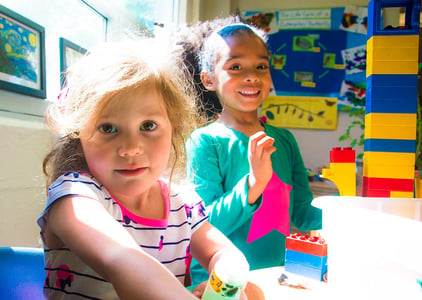
Strong cognitive skills in early childhood are associated with later school success. Cognitive skills are the mental processes that help us think, analyze, reason, and solve problems. These mental processes are complex and include a number of sub-skills that include attention, perception, memory, use of language, problem solving, and creativity – a set of skills referred to as executive function.
While cognitive skills may look very different as children grow and develop, the importance of these skills cannot be understated. The toddler who is trying out different puzzle pieces to figure out where they fit is developing cognitive skills, as is the high schooler who is examining graphed data to identify trends. In both cases, they are building on cognitive processes that will help them continue to learn throughout their lives.
To be successful learners, children must learn to attend classroom activities, understand that other people have different feelings or points of view, manipulate information in their heads, effectively communicate, and develop problem skills to solve problems. Children who have difficulty with any of these skills may find school too challenging. Fortunately, research shows that parents, teachers, and other adults can help children develop their cognitive processes through deliberate actions like those measured with CLASS.
The types of educator-student interactions identified by the CLASS have been associated with the development of specific cognitive skills that underlie learning. For example, the domains of Emotional Support, Classroom Organization, and Instructional Support all positively predict to executive functioning; the cognitive processes that include working memory, cognitive inhibitory control, and cognitive flexibility.
In a 2013 study, Weiland, Ulvestad, Sachs, and Yoshikawa explored the relationship between classroom quality and children’s receptive vocabularies and executive functioning skills. Their sample included 414 children who were enrolled in the city of Boston’s public pre-k program. They found a significant association between the three domains of the CLASS and children’s scores on the Pencil Tapping task, a widely used measure of cognitive inhibitory control and memory. During this test, children are directed to tap a pencil once after the adult taps the pencil twice. This test requires that children hold two pieces of information in their minds and also tests the child’s inhibitory control over the natural impulse to repeat the actions of the adult.
Rimm-Kaufman, Curby, Grimm, Nathanson, & Brock (2009) also examined the impact of classroom quality on children’s self-regulation. They used four subtests of the Preschool Self-Regulation Assessment, which included the Pencil Tapping task, to assess the self-regulation skills of 172 kindergarteners. They learned that higher levels of Classroom Organization and Instructional Support were positively associated with cognitive and behavioral self-control. In addition, students who entered kindergarten with better self-regulation displayed greater behavioral self-control and work habits at the end of kindergarten.
The relationship between cognitive skills and longer-term outcomes is clear: students who develop their analytic and executive function skills early in life tend to do better in school and, in turn, the workforce. Supportive relationships between children and adults can help bolster these skills.
Citations:
Rimm-Kaufman, S. E, Curby, T. W, Grimm, K. J., Nathanson, L., & Brock, L. L. (2009). The contribution of children’s self-regulation and classroom quality to children’s adaptive behaviors in the kindergarten classroom. Developmental Psychology, 45(4), 958–972.
Weiland, C., Ulvestad, K., Sachs, J., & Yoshikawa, H. (2013). Associations between classroom quality and children’s vocabulary and executive function skills in an urban public prekindergarten program. Early Childhood Research Quarterly, 28(2), 199-209.
